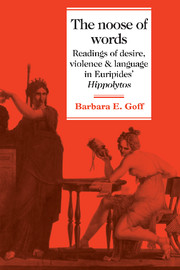Summary
This is a study of Euripides' Hippolytos, ‘one of the most-loved and most-studied of Euripides' plays’ (Michelini 1987: xiv). Each of the five chapters elaborates a different focus of analysis, and together they construct a reading of the Hippolytos that differs significantly from other available treatments, both in detail and in its overall allegiances. Connections among the chapters are provided by the notions of speech and silence as they are debated throughout the play. In the first chapter the opposition of speech and silence is read to articulate relations of gender and of power. In the second, third and fourth chapters this opposition provides a heuristic to construct the play's related discourses on desire, violence and language. In the fifth chapter, which concerns itself solely with the ending, the play is read to turn its gaze inward, so that speech and silence, desire, violence and language reappear as problems not only for the society within which the play emerges and which it addresses, but also for the play's internal representation of its external achievement.
My study differs from other recent treatments in that it does not rely on one argument or term of analysis but adopts a plurality of approaches to the text. Such multiplicity is afforded not only by present-day critical practices, about which I shall have more to say later, but also by the historical context of the play in fifth-century Athens.
- Type
- Chapter
- Information
- The Noose of WordsReadings of Desire, Violence and Language in Euripides' Hippolytos, pp. ix - xiPublisher: Cambridge University PressPrint publication year: 1990



